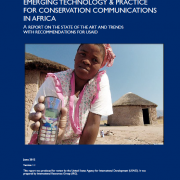The Future of BPO: “Cherry Blossoming,” “Gold Farming,” and “Microwork”?
 Usually our discussions of ICT and economic growth follow a familiar narrative: how can we use ICTs to more efficiently perform economic tasks? We take this line of discussion because we know that efficiency is productivity, and productivity improvements lead to economic growth.
Usually our discussions of ICT and economic growth follow a familiar narrative: how can we use ICTs to more efficiently perform economic tasks? We take this line of discussion because we know that efficiency is productivity, and productivity improvements lead to economic growth.
But a recent book published by the World Bank, called “Knowledge Map of the Virtual Economy,” suggests that this line of thought is boxing us in. Instead, it argues, we should ask “what completely new markets have been created by ICT growth, and how can poor people lead the way in these new industries?” If this sounds fanciful consider the following: last year a man in California paid $500 in an online auction for a “virtual” castle. We are not talking about a crumbling, stone-and-mortar, historical relic here; but rather a few lines of code that generate a castle that the buyer can use as a base for his virtual armies in an online video game. He bought this castle from a company in China that creates (and speculates in) these types of virtual products. This Chinese company employs young people, mostly male, from lower class or working class backgrounds. The workers have a decent education but little opportunity, and they are making a healthy living in a completely new industry that offers returns too low to seriously interest anyone in the developed world. But for them it’s a gold mine.
Or rather it’s a “gold farm,” which is the term that has come into use to describe these types of companies (the industry as a whole is known as “gold farming”). Gold farming was a $3 billion industry globally in 2010, and generated jobs for 100,000 full time equivalent workers. But, of the new opportunities identified by the report it is the most demanding of its workers. Other new industries can employ people with less-advanced skill sets.
One of these is called “Cherry Blossoming.” Derived from a Japanese-language slang expression (“Sakura” in Japanese means both “cherry blossom” and “paid spectator”) the name refers to an industry that sells social media “status” to companies looking to use these tools as part of their marketing strategy. For example, a company that has just started a Twitter feed may not want to go through a growth period where they have only a few followers, for fear that this low number will reflect poorly on their product or business. So “cherry blossoming” firms offer these companies the opportunity to buy Twitter followers, by the thousands. Similarly, they sell “Facebook likes.”
This business involves a large number of extremely small tasks that each generate a very low return for the company. A worker will sit at a terminal and, using a host of different profiles and accounts, “like” or “follow” their client companies. Each “like” may only take a few moments, and earn the company only a few cents. For example, a quick Google search will reveal that it is possible to buy 1000 Twitter followers for $20. This type of repetitive, low-margin work does not interest developed world companies, but in the developing world it can offer reliable income to poorly educated people who don’t have any other opportunities.
Though Cherry Blossoming is controversial, it is representative of the emerging field of “microwork,” which on the whole is not. Microwork is usually defined as a task that takes under 30 seconds to complete. Companies throughout the world have lots of this work to do, and it is now possible to parse tasks out and have them done by the very poor in the developing world.
Samasource, a non-profit organization focused on generating employment opportunities in Kenya, is one organziation that does this. They contract with large firms, in this case Silicon Valley tech firms, and perform microtask after microtask out of large telecenters the organization sets up in Africa. The group’s first contract involved digitizing text. This is often difficult for a computer to do, and near impossible if the document to be digitized is handwritten. So Samasource workers will look at scanned copies of the document and manually type in words that the software cannot comprehend. This does not even require the worker to be literate – they just need to be able to recognize all the letters by shape and match them to the keyboard. Samasource has expanded into other small tasks as well, such as vetting sites for inappropriate images and video, and verifying business listings for crowd-sourced yellow-pages sites.
Performing these micro-tasks gives “dignified digital work” to poor people, as Samasource puts it. They have even managed to set up and operate a successful business that employs many people in a refugee camp in Dadaab, on the Kenya-Somalia border.
The next iteration of micro-task work is to find a way to do it on mobile phones. The industry isn’t quite there yet, but once it is there will be no geographic limit to who can easily make a living out of the digital economy. This is the next generation of business process outsourcing, and it holds the potential to employ many poor and at-risk youth in the developing world.
If this discussion gives you any ideas, you may want to try to develop them. The World Bank is considering holding a “Mobile Micro-work Challenge,” where they would fund promising start-ups in the field.






































